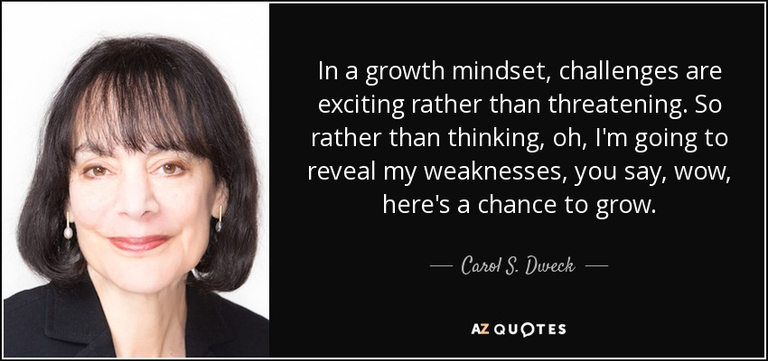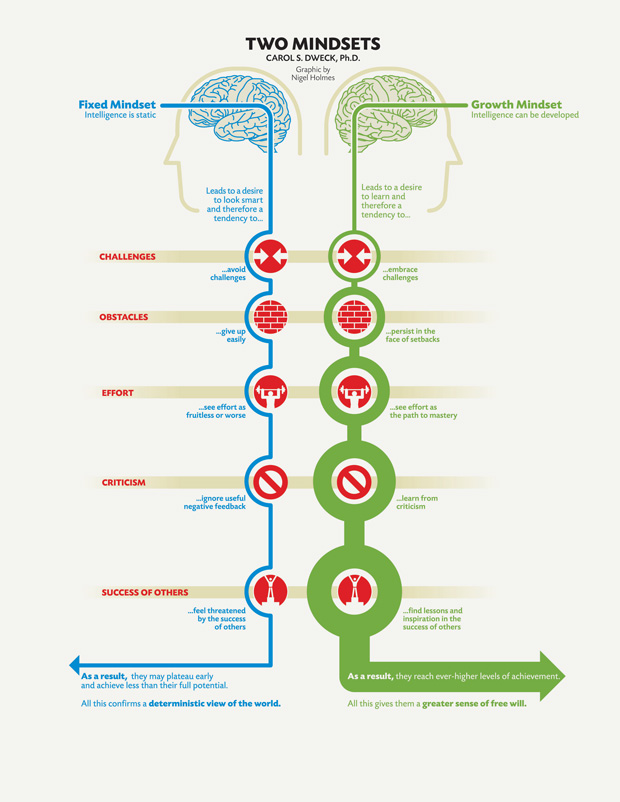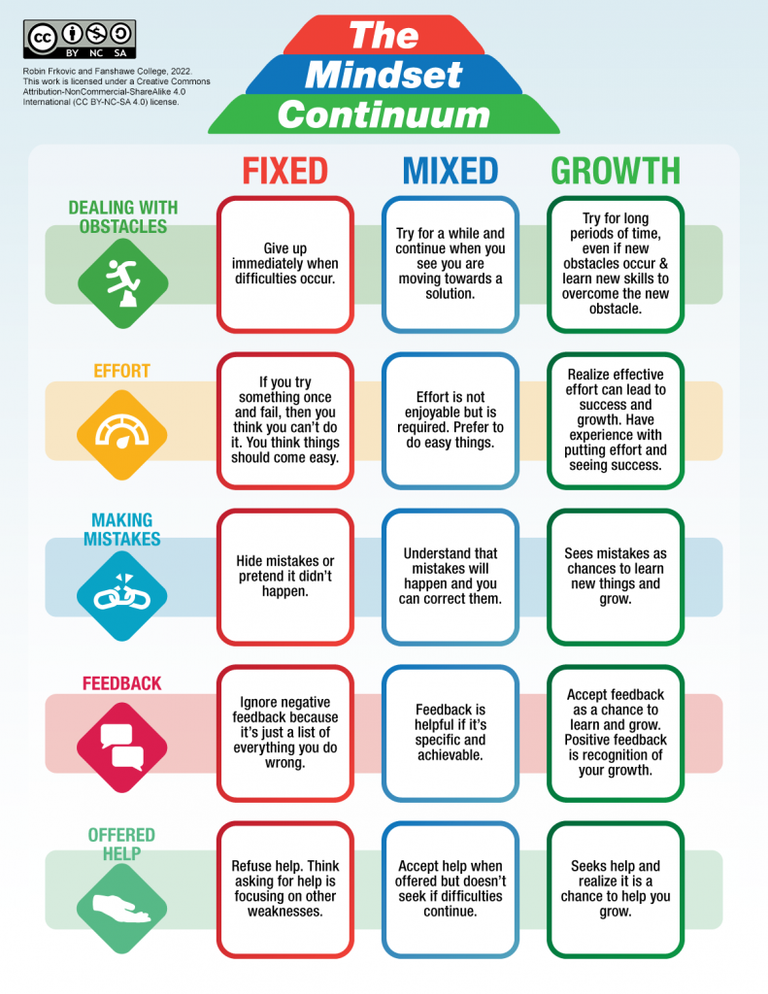In a recent post, we looked at the topic of 'Free Will and Change: Gamification for Change Management'. And because Growth Mindset has a significant impact on the personal will to change, we will look at the concept of Growth Mindset and HOW GAMIFICATION PROMOTES GROWTH MINDSET.
It shapes the way people perceive and respond to challenges, failures and successes, and thus significantly influences their willingness to change and develop. Now we will look at the concept of Growth Mindset. We will explore the key features of this mindset and how it can influence performance and learning. We will also look at the research of Carol Dweck, David Yeager and Ali Crum who have further developed the Growth Mindset. At the end, we'll share some practical tips on how Gamification can act as a catalyst for the Growth Mindset.
What is the Growth Mindset?
The Growth Mindset is a concept that helps us take on challenges and optimize our performance. It is based on the idea that we should distance our identity from our performance. Instead of defining ourselves by our abilities, we focus on developing and learning.

Dweck's work began by studying the impact of setbacks on school children - the way some kids pick themselves up after a setback, pull themselves together and move on, while others are devastated by it.
In numerous published studies, Dweck and her team have consistently shown that when we believe we can become smarter, learn, develop, and improve, we invest more time and effort, and that this leads to higher performance.
Instead of devaluing ourselves when we fail or are not immediately successful, we view our performance as a snapshot that can evolve over time. This makes it easier for us to learn from our mistakes and constantly improve.
A key aspect of the Growth Mindset is focusing on our own effort and learning process. Instead of focusing solely on the outcome, we value our personal progress and individual efforts. We recognize that the road to success may be fraught with setbacks, but every challenge offers us the opportunity to grow and develop.

By focusing our motivation on our own efforts and the learning process, we are able to consistently pursue our goals and overcome obstacles. Instead of being discouraged by failures, we see them as part of the process and use them as an incentive to keep challenging ourselves.
The Growth Mindset is thus a valuable concept that helps us awaken our performance and realize our full potential. By distancing ourselves from our own performance and focusing on the learning process, we can continuously improve and face new challenges.
Growth Mindset in companies
Feedback and praise play a significant role in enhancing the performance of individuals, especially those who are already successful. However, feedback and praise that link identity to performance can also have negative effects. The concept of Growth Mindset vs Fixed Mindset has shown that feedback and praise based on intelligence (identity; label) can cause performance to decline over time.

A workforce with a growth mindset can provide numerous benefits to an organization. The growth mindset promotes the belief that skills and intelligence can be developed through effort and continuous learning. Here are some of the key benefits:
Reaction to changes: Employees with a growth mindset are better able to adapt to market changes, new technologies or internal restructuring.
Innovative strength: A growth mindset promotes a willingness to take risks and try out new ideas, which can lead to more innovation.
Willingness to learn: Employees are more motivated to learn new skills and improve in their roles, resulting in higher overall performance.
Efficiency: A willingness to learn from mistakes rather than avoid them can make processes more efficient and increase productivity.
Higher satisfaction: Employees who believe they can improve tend to be more satisfied and engaged in their work.
Reduced fluctuation: A growth mindset can help employees feel valued and empowered, which increases retention.
Collaboration: Employees with a growth mindset are often more open to feedback and collaboration, leading to better team dynamics.
Conflict Resolution: A growth mindset can help ensure that conflicts are seen as opportunities for improvement rather than threats.
Sustainable growth: Companies that foster a culture of learning and improvement are better positioned for long-term success and sustainability.
Market positioning: A growth mindset can be an important competitive advantage, especially in fast-moving or disruptive industries.
Leadership Pipeline: A growth mindset encourages leadership development at all levels, which facilitates future leadership selection.
Authentic leadership: Leaders with a growth mindset are often more effective at managing employees, as they are more likely to use coaching approaches and encourage employee development.
Overall, a growth mindset can create a culture of continuous improvement that has a positive impact on performance, employee satisfaction, and ultimately business success. It thus also harmonizes well with gamification approaches that focus on intrinsic motivation, autonomy and mastery.
- Honesty: There is even another knowledge on the Growth Mindset: People who have this are also more honest when describing a real situation. Especially if the situation is not perfect.
Gamification as a catalyst for growth mindset
1. Focus on the process, not only the result
Gamification-Design often emphasizes the entire process of learning and development. By applying basic principles of behavioral psychology, such as the Progress principle, the Hook Model, or also the knowledge around the effect of Neurotransmitters, participants are constantly made aware that they are on a journey of improvement. This is in line with the core principle of the Growth Mindset, which focuses on the learning process and effort.
2. mistakes as learning opportunities
In gamified environments, failures are often presented as opportunities for growth and learning. The ability to retry levels or challenges minimizes the fear of failure and increases readiness, learn from mistakes.
3. autonomy and choice
Gamification often allows participants to make their own decisions and follow their own path. This autonomy is key to fostering the Growth Mindset, as it gives participants control over their own learning.
4. immediate feedback
Gamified systems typically provide immediate feedback through a consistent and apparent response to current actions. This feedback is often focused on effort and effort, consistent with the Growth Mindset, which emphasizes the value of effort and continuous learning. This realization alone renders absurd the vast majority of scoring and badging systems, as well as rankings and similar feedback and incentive applications.
5. community and cooperation
Many gamification approaches encourage teamwork and community, which increases openness to feedback and willingness to collaborate. This is critical to developing a growth mindset that recognizes the importance of external feedback and continuous learning.
6. master and challenge
Gamified environments often provide "fail states" or major challenges that require skill mastery. These challenges are often designed to be difficult but achievable, which helps participants recognize and appreciate their own abilities.
7. intrinsic motivation
Gamification design aims to promote intrinsic motivation through elements such as curiosity, challenge, and mastery. These elements are closely linked to the Growth Mindset (see work by Dr. Carl Dweck, Dr. David Yeager), which also promotes intrinsic motivation for continuous improvement.
8. personalized paths
Modern gamification often provides personalized learning paths that meet the individual needs and abilities of participants. This promotes a Growth Mindset by enabling participants to identify and work on their own strengths and weaknesses.
9. transparency and self-reflection
Through dashboards and other analytics tools, participants can perceive their progress and also the 'moment-of-truth' (moment of expectant failure; author's note). This transparency promotes self-reflection, a key component of the Growth Mindset.
10. long-term development
Gamification is often focused on long-term goals and development, which aligns perfectly with the Growth Mindset, which also promotes a long-term approach to personal and professional development.
Overall, gamification offers a wealth of opportunities to foster the Growth Mindset in a variety of contexts, from education to corporate culture. It creates an environment that emphasizes the principles of effort, continuous learning, and overcoming challenges, all of which are central to developing a Growth Mindset.
Conclusion
The synergy between Gamification and the Growth Mindset provides a powerful set of tools to promote learning, adaptability, and continuous improvement in both individual and organizational contexts. Gamification serves not only as a catalyst for engagement and motivation, but also as an amplifier of the basic principles of the Growth Mindset: effort, willingness to learn, and the ability to learn from mistakes.
Integrating gamification elements into learning and work environments can help create a culture of continuous improvement that positively impacts performance, employee satisfaction, and ultimately business success. It is important that gamification is not viewed as an isolated tool, but as one component of a comprehensive approach to fostering a growth mindset.
Research by Dr. Carol Dweck, Dr. David Yeager and also others such as Dr. Ali Crum and other numerous case studies prove the effectiveness of this integrated approach. Companies that successfully implement such a culture can benefit from increased innovation, greater adaptability to market changes, and higher overall employee satisfaction.
At a time when change is the only constant, the combination of Gamification and Growth Mindset offers a sustainable solution to the challenges of the modern workplace. It enables individuals and organizations to not only survive, but thrive in an ever-changing environment.
This approach is not just a fad, but a sound method based on solid psychological and pedagogical principles. It provides a framework for developing strategies that help people realize their full potential and continuously evolve. Therefore, it is time to consider Gamification and Growth Mindset as integral components of successful organizational development.